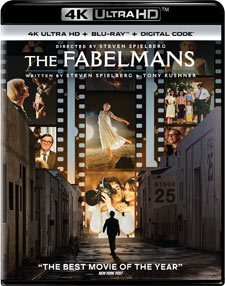
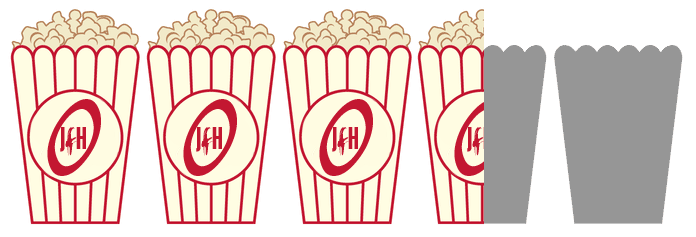
 - for some strong language, thematic elements, brief violence and drug use.
- for some strong language, thematic elements, brief violence and drug use.
Growing up in post-World War II era Arizona, young Sammy Fabelman aspires to become a filmmaker as he reaches adolescence, but soon discovers a shattering family secret and explores how the power of films can help him see the truth. (from IMDb)
It's pretty safe to say that director Steven Spielberg is one of the most influential filmmakers in the history of cinema. Now at over 75 years old, it makes sense that Spielberg would be looking back at his life and career, and the end result is a semi-autobiographical feature, titled The Fabelmans. While the family and their names are ficitionalized, the characters and story are based off of Steven's own parents and childhood experiences. Michelle Williams - who earned an Oscar nod for her performance as Mitzi in this film - and Paul Dano play the Fabelman parents, and their looks are modeled exactly after Steven's late parents. Sammy Fabelman is played by a couple actors - mostly Gabriel LaBelle - which is ultimately Steven's character. Spielberg has said that many characters in the film were a combination of real people in his life, and events were condensed or out of order a bit, but for the most part, the film is inspired by Spielberg's journey. Knowing that fact going into viewing The Fabelmans is a little trippy, especially since many of us have grown up watching this man's cinematic creations, like Raiders of the Lost Ark, Jaws, Jurassic Park, E.T., and more, and now we're watching a movie he's made about himself.
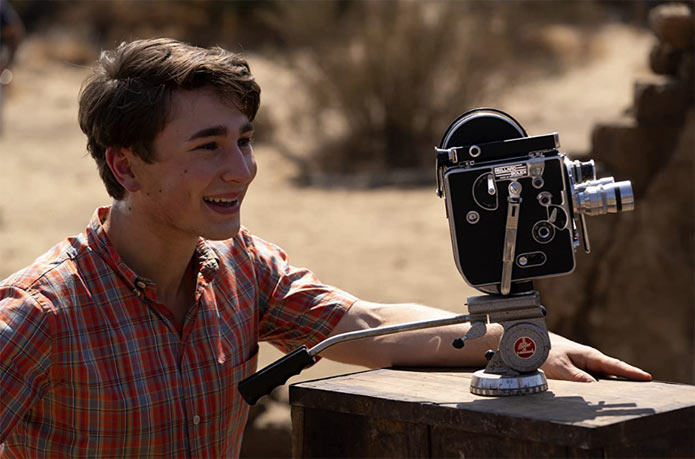
While Sammy's journey is the focal point for The Fabelmans, Michelle Williams' Mitzi takes much of the spotlight as well. As we get a glimpse of Sammy's world through his eyes and his camera lens, we also spend ample time with Mitzi to get to know the most spirited person in the family. Dano's portrayal as Burt Fabelman is quiet and reserved, and when he's not sharing meaningful moments alone with his son, he kind of recedes into the background while others around him take center stage. Williams is wonderful as Mitzi, and while I've never been a fan of hers, I found her performance enchanting here. Sadly, though, Sammy's experiences filming the family uncovers some unfaithfulness on his mother's part, simultaneously discouraging him from ever wanting to pick up a film camera again (could you imagine?!). I thought Gabriel LaBelle's performance as Sammy seemed oddly wooden at first, but as the film progressed and he continued to grow and mature, LaBelle's performance seemed more comfortable and he really came alive.
As you might imagine from the aforementioned parental drama, there are a lot more themes swirling around in The Fabelmans than just a kid discovering his love - and knack - for making movies. When we follow Sammy to a new school, he encounters anti-Semetic bullying, which even leads to suffering a bloody nose from a punch to the face. He then meets a Jesus-loving girl named Monica who attempts to save his Jewish soul. Monica has an intense zeal for Jesus, but it seems more like a physical infatuation than a true love and admiration for the Savior. There's even an awkward scene where she tries to get Sammy to accept Jesus into his heart and she attempts to "breathe" the Holy Spirit into his mouth... before kissing him and throwing him onto her bed -- under a large crucifix above the headboard (but they're interrupted so the kissing doesn't progress past that). Monica later uses the Lord's name in vain and then reveals her romantic intentions with Sammy weren't more than just having some fun. And in an earlier scene, a bully screams at Sammy multiple times to apologize for "killing Christ." It's clear Spielberg has some issues with Christians - and I can't imagine what it was like to deal with such anti-Semitic people in his youth - but it becomes an awkward theme in the film. Some of it is presented in a way that's meant to be light and funny - like Monica trying to convert Sammy - but I still think it's likely to offend some Christian viewers.
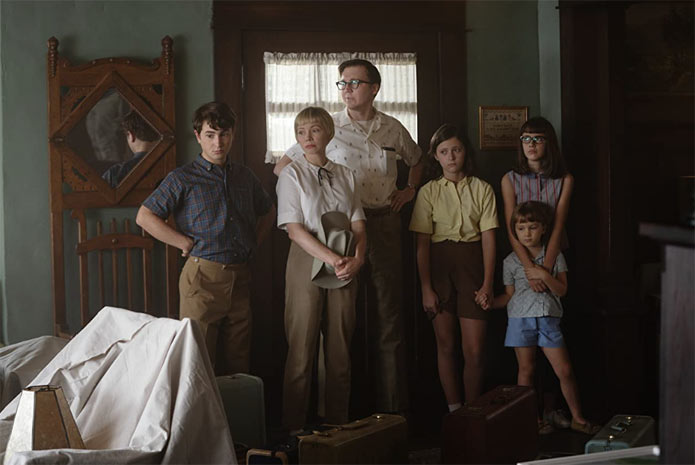
Speaking of content, there is definitely some language sprinkled throughout the film, albeit infrequently. One of the last lines in the entire film contains the movie's lone use of the "F" word, but I assume it's mostly included for "historical accuracy." There are several uses of the "S" word, as well as "g*dd*mn" and "J-sus Chr-st" and several other cuss words. There are also some Jewish racial slurs, and some relatively intense bullying scenes. There is no graphic sexual content, but a woman has an affair outside of her marriage (although it seems she didn't take it as far as one might assume), and Sammy is jumped by Monica onto her bed, but they're interrupted before it goes past kissing (However, it seemed like she intended for it to go further). There is some violence in the movies that Sammy makes, with the worst being a war film where several victims use blood packets hidden in their hands to have blood squirt on their chest or on their faces as they're "shot." In real life, however, some pushing around and punching happens, but the worst comes when Logan punches Sammy in the face, resulting in a very bloody nose. Lastly, there's a scene where one of the Grandmothers passes away, and we see Sammy fixating on the pulse beating in her neck until it stops when she dies. It's a pretty heavy moment (especially when Mitzi gets hysterical over her mother's death), and it could possibly disturb some sensitive viewers.
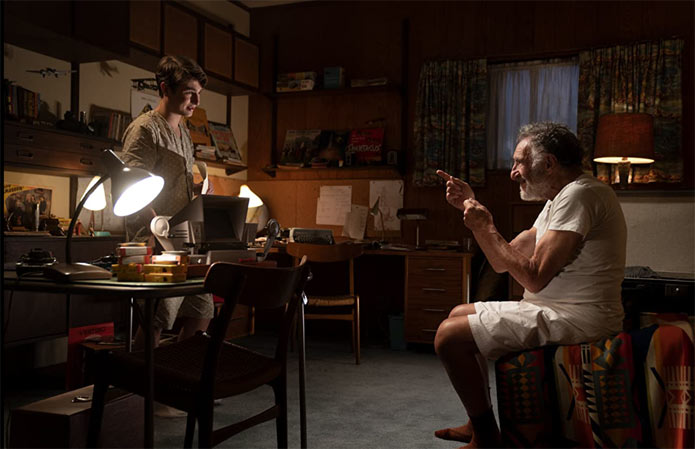
While the movie is largely about Sammy's journey from a kid afraid of the idea of sitting in a dark theater, to becoming a budding filmmaker himself, there's lots of drama in its lengthy 2-and-a-half-hour runtime. But there's also wonder and joy captured in this film as well. Judd Hirsch's character is only in the movie for a very short time, but he delivers a performance so captivating, it's no surprise it earned him an Oscar nomination this year. He makes a declaration about art and film and creating that is crazy yet inspiring -- and it encourages Sammy to not give up on his passions. There's also a recurring theme of forgiveness which helps elevate the content, as no character is really presented as the film's main villain or antagonist; it's just a series of characters based on real people that helped influence a filmmaker's journey. While the runtime does feel a little long, it's easy to get caught up in the story to the point that, when the film does eventually draw to a close, you're actually left wanting more. In a way, that's good, but the movie doesn't really feel like it has a satisfying finish. When it ended, my wife and I were both surprised and both thinking "What? That's it?! It ends there??" Again, it's not enough to sink the film, but I did feel like it was a risky way to end the movie. In a way, it feels like Spielberg just wasn't sure how to end it, and then just abruptly said "OK, we're done!" (Perhaps he felt like it was an adequate story to lead up to his vast filmography as a filmmaker?) Not all of the scenes feel crucial to the story, either, and the progression from one moment to another can feel a little jarring, but in the end, The Fabelmans still feels like an intimate peek into what made Steven Spielberg the filmmaking great that he is.
If you're a Spielberg fan, or a fan of period dramas or filmmaking, The Fabelmans is certainly worth checking out. There isn't a weak performance in the bunch, the cinematography is great, and John Williams' latest film score is a beautiful one. While hardly the best picture of 2022, or even one of Spielberg's best, The Fabelmans is a solid drama with a lot to unpack, and a rare experience of being able to share a personal moment with a celebrated storyteller.
- John DiBiase (reviewed: 2/15/23)
Universal brings home The Fabelmans on Blu-Ray, DVD, Digital and 4K Ultra HD. The 4K set includes a 4K Ultra HD Blu-ray Disc, a standard Blu-ray disc, and a Movies Anywhere 4K digital copy. In addition to that, we have the following bonus content:
The Fabelmans in 4K UHD - The movie looks lovely in 4K, although I admit it doesn't seem too much different than a Blu-Ray transfer. However, it's especially noticeable in scenes like the one where the telephone pole falls and sparks fly, and in the film's overall color vibrancy. In the end, if you're a 4K junky, this is a good one for the format.
The Fabelmans: A Personal Journey (11:00) - Steven Spielberg co-wrote this story with Tony Kushner, who he first worked together with on Munich, basing this movie on his own life. Steven and the filmmakers talk about how this movie is about family and forgiveness. (2 "a" word, 2 middle fingers).
Family Dynamics (15:29) details the casting in the film, covering each major player, their role in the film and how they related to the real life people in Steven's life. (1 "Oh my G-d")
Crafting the World of the Fabelmans (22:05) - The final, and longest, featurette is dedicated to the movie's set design. They actually went so far as to recreate Steven's childhood homes! They discuss film editing, including the scene where Mitzi's secret is discovered, filming Ditch Day, and more.
- John DiBiase (reviewed: 2/15/23)
Disclaimer: All reviews are based solely on the opinions of the reviewer. Most reviews are rated on how the reviewer enjoyed the film overall, not exclusively on content. However, if the content really affects the reviewer's opinion and experience of the film, it will definitely affect the reviewer's overall rating.
 Casey J Drops First Album in 6 Years, "The Stories We Sing Vol. 1" Casey J Drops First Album in 6 Years, "The Stories We Sing Vol. 1"Thu, 05 Mar 2026 13:46:00 EST |
 The K-LOVE Fan Awards Returns to Nashville's Opry House May 24 The K-LOVE Fan Awards Returns to Nashville's Opry House May 24Thu, 05 Mar 2026 13:35:00 EST |
 StowTown Records Releases New Album "Rise and Shine" from Sunday Drive StowTown Records Releases New Album "Rise and Shine" from Sunday DriveThu, 05 Mar 2026 13:12:00 EST |
 Mat Kearney Announces "Nothing Left To Lose" 20th Anniversary Tour Mat Kearney Announces "Nothing Left To Lose" 20th Anniversary TourWed, 04 Mar 2026 19:10:00 EST |
 We The Kingdom Celebrates RIAA Gold Certification of "God So Loved" We The Kingdom Celebrates RIAA Gold Certification of "God So Loved"Tue, 03 Mar 2026 18:40:00 EST |
 Mary-Clair Attends Lionsgate's "I Can Only Imagine 2" Premiere Mary-Clair Attends Lionsgate's "I Can Only Imagine 2" PremiereTue, 03 Mar 2026 18:30:00 EST |
 Stand41TrueGod to Release New Single "Wilderness" on All Platforms March 13 Stand41TrueGod to Release New Single "Wilderness" on All Platforms March 13Tue, 03 Mar 2026 18:20:00 EST |
 Click here All News Headlines |
Click here All News Headlines |